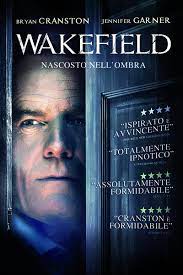
WAKEFIELD
US, 2017, 106 minutes, Colour.
Bryan Cranston, Jennifer Garner, Beverly D'Angelo, Jason O'Mara.
Directed by Robin Swicord.
Wakefield is based on a short story by the celebrated novelist, E.L Doctorow, best known for Ragtime. The writer-director is Robin Swicord who has a long history of screenwriting, Little Women, as well as directing the Jane Austen Club.
The film offers the opportunity for a tour-de-force performance from Bryan Cranston, emerging from his success on television in the series, Breaking Bad. And, at this time, he appeared as Lyndon Johnson in All the Way as well as the blacklisted writer, Dalton Trumbo, in Trumbo.
Cranston is Howard Wakefield, who works in Manhattan, is seen at the rail station, travelling home to the suburbs when his train experiences blackout and the passengers have to walk to their destination. When he arrives at his home, in the night, Wakefield does not go in, rather goes up to the upper story of the garage and, ultimately, decides not to go into the house but to stay away. Basically this is the story of Wakefield staying away, although there are quite a number of flashbacks to his relationship with his wife, Diana, Jennifer Garner, their meeting, courtship, his betrayal of her friend, her pregnancy, the birth of twins, the jealousy games that they began to play and the effect on each of them. Wakefield has not been a particularly strong presence to his daughters in their teens.
The film uses the device of strong voice-over by Wakefield, describing what is happening, describing his thoughts, feelings, hesitations, decisions, consequences. He stays in the flat, observing through the windows, hiding himself. Eventually, hair growing long, long beard, going out and looking like the homeless people in the streets, scavenging in rubbish bins for food and anything else, he gets into a way of life.
When his wife and children go on a summer vacation, taken by his wife’s mother whom he loathes, he ventures out, sitting in the park, being offered a dollar by a kind little boy, enjoying a burger. He also encounters some of the disadvantaged children who gather at his next door neighbours, especially Herbert, living with Down Syndrome, and Emily, who are kind to Howard, bringing food, comfort him during the winter, but demanding their silence.
Ultimately, Howard has to make a decision, whether to walk away completely, whether to stay in the garage, or return to what he was a year earlier, haircut, shaving, driving to New York, buying proper clothes, going back to his workplace. Eventually, he stands at the door of the house, debating, and eventually going in, the film ending, leaving it for the audience to speculate as to what would happen.
- The title, blunt, the focus on Howard Wakefield? His story?
- Based on a short story by E.L, Doctorow?
- New York State, the opening, the rail station, the spectacular foyer, the crowds? The train journey? The blackout, walking along the tracks? The suburbs, homes, woods, the garage, interiors? Interiors of the home? The town, the streets, rubbish bins, parks, shops? The musical score?
- Audience response to Howard Wakefield, Bryan Cranston’s screen presence and career, busy at the railway station, New York work, briefcase, in the train, the tracks, not going into the house, going to the garage, the upper room, the windows, watching his wife and daughters?
- The voice-over, the inner life of Howard Wakefield, decisions, motivations, lack of decision? His option for staying in the garage, continuing there? The possibility of returning? His comments about himself, about his wife, memories of their meeting, her dancing, friendship with Dirk, his attraction, betrayal of Dirk, Dirk hitting him, marrying Diana, her pregnancy, the twins, their growing up, his being a father, an absent father? His judgements about himself, his excuses?
- The decision to stay in the garage, his managing, going to the house, the food, time passing, hair and beard growing, scrounging in the rubbish for food, for all kinds of possessions? No explanation about his laundry? Scavenging books and reading, the radio, the absence of news, television? What was happening to him?
- Diana, her personality, dancing, her theories about the body, exposure, her daughters? The initial relationship with Dirk, then with Howard? The years of marriage? Howard’s explanation about the games, jealousy, the flashbacks, the interactions, the sexual encounters, the effect on Howard, the effect on Diana over the years?
- Diana, Howard absent, the visit of the police, her mother coming in, Howard’s disdain of her? The later gathering of people, Howard’s suspicions? His continuing to observe? Her behaviour over the months, the twins, their age, interactions, going to school?
- Howard observing the neighbours, Herbert living with Down Syndrome, Emily, Emily watching him? The later encounter with them, friendship, conversation, the helping him, food? The coming to the attic, Howard’s comment about Portia’s speech from The Merchant of Venice, Mercy? Secrecy? Their leaving?
- Howard, the time passing, the encounter with the homeless in the street, the Russian group, fighting for food, chases? Looking at himself in the mirror after Emily looked at herself? His image of himself?
- The family going for their holiday, with Diana’s mother, the danger of his being discovered, concealing himself? The return?
- The winter, cold, the help from Emily and Herbert? Taking stock of himself?
- The special meal, the guest, Howard coming out, discovering it was Dirk?
- The decision to come out of himself, haircut, shave, driving the car, the shops in New York, the new clothes, able to go back to work?
- Returning, outside, decision to go into the house or not, going in? The film ending? Leaving it to audience speculation?